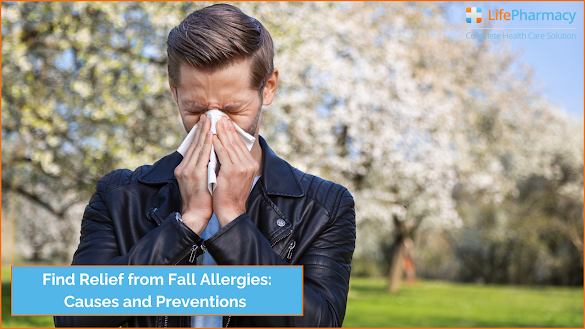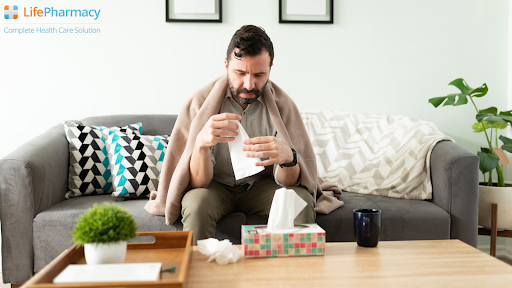Understanding the reasons for fall hypersensitive reactions and taking preventive measures can provide tons-wished alleviation and allow people to embody the season's splendor. Fortunately, one can take numerous strategies and precautions to relieve fall allergies.
This article will discover the triggers behind fall hypersensitive reactions and discuss powerful prevention strategies to help individuals discover alleviation and enjoy the fall season to its fullest. Let's dive into allergic reactions and discover ways to alleviate their impact on our lives.
Understanding the Causes Behind Fall Allergies
Fall allergies, often classified as allergic rhinitis or colloquially referred to as hay fever, manifest when your immune system reacts to inhaled pollen. This immune response can lead to a range of discomforting symptoms, including:
Congestion
One of the hallmark symptoms of fall allergies is nasal congestion. The body's immune response to pollen triggers irritation within the nasal passages, causing them to swell and slim. This constriction of the airways can result in stuffiness and difficulty breathing through the nose.
Itchy Eyes
Among individuals grappling with fall allergies, itchy and watery eyes stand out as a common concern. These eye-associated problems regularly arise when airborne pollen particles touch the eyes, triggering an immune reaction that results in itching and inflammation. Proper eye care turns into paramount in coping with those symptoms efficiently.
Runny Nose
A runny nose, or rhinorrhea, is another common symptom. The body's attempt to flush out allergens from the nasal passages can produce excess clear, watery mucus, leading to a constant dripping sensation.
Sneezing
Sneezing is the body's reflex response to expel irritants from the nasal passages. In the case of fall allergies, the immune system's reaction to pollen often triggers repeated bouts of sneezing.
Post-Nasal Drip
Post-nasal drip occurs when excess mucus in the nasal passages drips down the back of the throat. This can cause a persistent sensation of needing to clear the throat and lead to coughing.
It's important to note that allergic rhinitis encompasses two main categories: seasonal allergies and perennial allergies.
Seasonal Allergies
As the name shows, seasonal allergic reactions arise during specific instances of the year while particular vegetation launches pollen into the air. In the context of fall allergies, ragweed pollen is a major culprit. Ragweed releases pollen in late summer and early fall, making this period particularly challenging for sensitive people.
Perennial Allergies
Unlike seasonal allergies, perennial allergies persist year-round. Indoor allergens, including dust mites, pet dander, mold spores, and cockroach droppings, generally prompt these allergic reactions. While seasonal allergies are connected to specific pollen-producing plants, perennial allergies are often associated with indoor environments.
Understanding the reasons and triggers of fall allergic reactions is crucial for efficiently coping with and preventing signs. By taking proactive measures and in search of appropriate treatments, people can locate remedies and revel in the beauty of the fall season without the weight of hypersensitive reaction-related soreness.
Navigating Fall Allergies: Practical Strategies for Relief
Embrace Pollen Avoidance
Fall hypersensitive reactions, regularly driven by using pollen within the air, may be bothersome for those sensitive to these allergens. To efficiently manipulate fall allergies, it is crucial to apprehend that the cornerstone of any prevention strategy lies in keeping off the allergens responsible for triggering your symptoms.
Close Your Windows
Opening windows during the fall breeze may be tempting, but invites pollen indoors. Opt for using your home's air conditioning or heating system, depending on the outside temperature.
Wash Up
After enjoying outdoor activities like apple-picking or hiking, thoroughly wash your hands and face when you return home. This practice helps remove lingering pollen and reduces the risk of irritation.
Change Clothes
Pollen can also settle on your clothing. Consider changing into an outfit that hasn't been exposed to the outdoors, keeping pollen at bay.
Delegate Outdoor Tasks
While yard work and outdoor chores are part of the seasonal routine, try to delegate them to others. Activities like lawn mowing, weeding, and raking leaves can exacerbate allergens and worsen your symptoms.
Leverage Face Masks
Face masks are not just for pandemics; they can be a treasured device for your allergic reaction-fighting arsenal. Wearing a mask covering your mouth and nose can save you from direct contact with pollen, imparting an extra layer of safety.
When to Seek Medical Attention for Fall Allergies
If you're experiencing fall allergy symptoms that are persistently severe or interfering significantly with your daily life, consider seeking medical attention. While some individuals find relief through over-the-counter allergy medications, there are situations where consulting a healthcare professional is advisable. Online pharmacies may be convenient for obtaining prescribed medicines or professional recommendations, but understanding while taking this step is vital.
If your fall allergy symptoms are escalating, persist for an extended period, or worsen despite using over-the-counter remedies from an online pharmacy, it's a prudent time to consider a medical consultation.
Related Posts: Ways to Manage Common Allergies
Conclusion
Understanding the causes of fall allergies and adopting effective preventive measures can improve your existence throughout this stunning yet allergen-laden season. By figuring out commonplace culprits like ragweed pollen and mildew spores, you could take proactive steps to minimize your publicity. Additionally, over the counter allergic reaction medicinal drugs and allergen avoidance techniques can offer plenty-wanted remedies.
However, if your fall allergy symptoms persist and worsen, or you require specific prescription medications or personalized guidance, don't hesitate to consult a healthcare professional. Utilizing the offerings of an online chemist can offer comfort and accessibility in acquiring prescribed medications or in search of expert recommendations, ensuring that you get the tailored support you need to control your hypersensitive reactions correctly.



Comments
Post a Comment